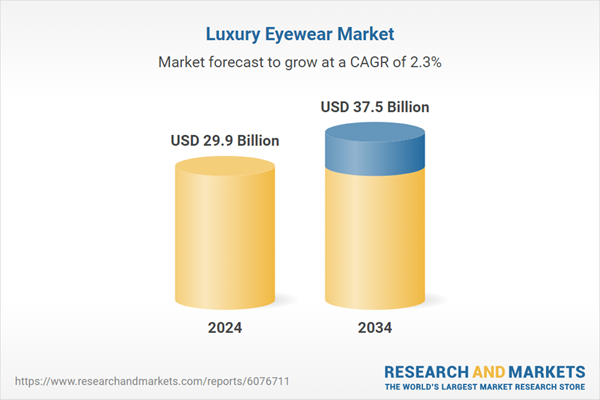The market has also seen a surge in consumers who view eyewear as an essential fashion accessory, not just a medical tool. A blend of craftsmanship, innovative design, and brand identity makes luxury eyewear highly desirable. Enhanced consumer experiences, from personalized fittings to premium packaging, are now playing a vital role in brand loyalty. Consumers are willing to invest in products that reflect their personal style, social status, and lifestyle choices. Digital channels and e-commerce platforms have increased global access, allowing more customers in Asia Pacific, Latin America, and the Middle East to explore premium eyewear offerings.
These regions have become important growth hubs, as aspirational buying continues to rise with greater exposure to global fashion trends and high-end products. In response to growing demand, manufacturers are continually introducing refreshed collections, focusing on limited-edition launches, exclusive online sales, and designer collaborations to elevate brand value and customer engagement. Technological upgrades like AI-based virtual try-ons and customization tools have helped brands provide immersive shopping experiences, especially in online environments. Meanwhile, the importance of sustainability and ethical production practices is growing, shaping brand narratives and influencing purchasing decisions across the luxury market.
Within the product category, sunglasses are expected to grow steadily at a CAGR of 2.1% through 2034. This growth stems from rising interest in fashion-driven accessories that also serve a functional purpose. New advancements in lens technology, such as blue light protection and anti-glare coatings, are making luxury sunglasses more appealing to health-conscious consumers. Lightweight frames and comfort-enhancing materials are gaining traction, especially among buyers who wear them for extended periods. Eyewear styles have evolved to include more dramatic shapes and bold designs that make a statement while offering eye protection. Contemporary collections focus on oversized silhouettes and angular frames that appeal to trend-savvy shoppers looking for standout pieces with high fashion value. The rising desire for distinctive looks is pushing luxury brands to innovate with design while maintaining the high standards of durability and performance.
Based on consumer demographics, women accounted for a dominant 47% share of the global market in 2024. This segment continues to be influenced by unique frame styles, vibrant colors, and expressive designs. For many female buyers, eyewear has become an integral part of their wardrobe, offering both utility and sophistication. Shapes like cat-eye, round, and geometric frames remain top choices due to their blend of practicality and visual impact. Designer offerings that combine premium materials with embellishments are especially popular among women seeking to make a personal style statement through their accessories. As eyewear becomes a reflection of individuality and elegance, the market is responding with collections tailored to cater to diverse preferences, further driving growth in this segment.
The U.S. luxury eyewear market stood at USD 8.6 billion in 2024, capturing an 83% share of the North American region. Consumer behavior in the country reflects a strong awareness of eye health paired with a growing appetite for fashionable, statement-making eyewear. As outdoor activities and digital screen time increase, demand for stylish yet protective eyewear continues to climb. American consumers prioritize products that align with their lifestyle, balancing aesthetics with comfort and performance. Brands have responded with innovative designs that blend visual appeal with features like UV protection and customizable fittings. Customization and digital innovation are particularly well-received in the U.S. market, where consumers expect seamless, tech-enabled shopping experiences. Additionally, the trend toward ethical fashion and sustainable sourcing has gained momentum, with more buyers considering environmental and social impact when choosing luxury products.
Key companies shaping the global luxury eyewear landscape include major fashion houses and established eyewear specialists. These players are diversifying retail strategies, expanding across digital platforms, and investing in technologies that enhance customer personalization. From augmented reality tools to limited-edition collaborations, leading brands are adapting to modern consumer expectations by delivering both exclusivity and value. The competitive landscape remains dynamic, driven by evolving fashion sensibilities, premium lifestyle aspirations, and a continuous push toward innovation.
Comprehensive Market Analysis and Forecast
- Industry trends, key growth drivers, challenges, future opportunities, and regulatory landscape
- Competitive landscape with Porter’s Five Forces and PESTEL analysis
- Market size, segmentation, and regional forecasts
- In-depth company profiles, business strategies, financial insights, and SWOT analysis
This product will be delivered within 2-4 business days.
Table of Contents
Companies Mentioned
The companies featured in this Luxury Eyewear market report include:- Balenciaga
- Bulgari
- Calvin Klein
- Cartier
- Christian Louboutin
- Dolce & Gabbana
- EssilorLuxottica
- Giorgio Armani
- Gucci
- LVMH
- Moscot
- Porsche Design
- Prada
- Ralph Lauren
- Tom Ford
Table Information
| Report Attribute | Details |
|---|---|
| No. of Pages | 220 |
| Published | April 2025 |
| Forecast Period | 2024 - 2034 |
| Estimated Market Value ( USD | $ 29.9 Billion |
| Forecasted Market Value ( USD | $ 37.5 Billion |
| Compound Annual Growth Rate | 2.3% |
| Regions Covered | Global |
| No. of Companies Mentioned | 16 |









